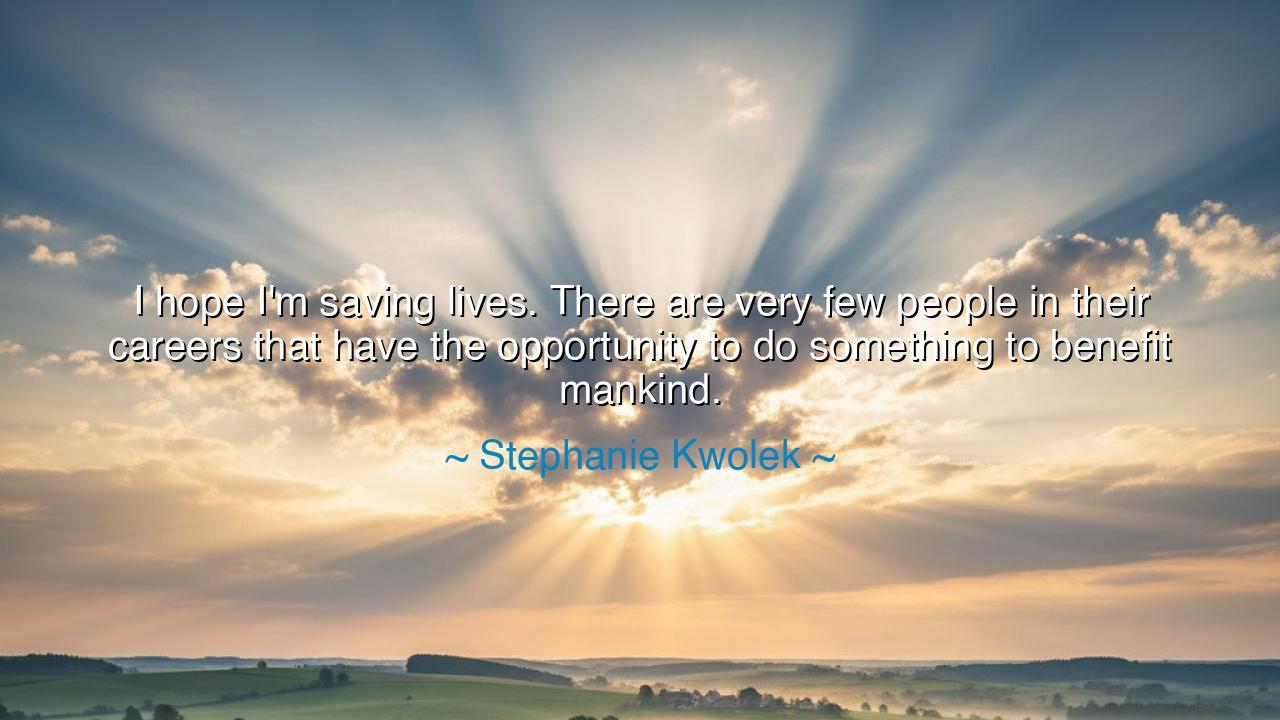
I hope I'm saving lives. There are very few people in their
I hope I'm saving lives. There are very few people in their careers that have the opportunity to do something to benefit mankind.






The words of Stephanie Kwolek, “I hope I'm saving lives. There are very few people in their careers that have the opportunity to do something to benefit mankind,” carry the quiet humility of a true creator — one who worked not for glory, but for service. They rise from the heart of a woman whose invention, Kevlar, would go on to shield countless lives from harm, from soldiers and police officers to ordinary citizens. In her voice, we hear neither pride nor ambition, but gratitude — a deep awareness that the noblest purpose of work is not personal success, but the betterment of the world. Her words echo the ancient belief that to serve others is to touch the divine.
Born in a time when few women were welcomed into science, Stephanie Kwolek devoted herself to chemistry with a relentless curiosity and quiet strength. Her discovery of Kevlar came not from a pursuit of wealth or acclaim, but from the persistence of one who refused to give up on an experiment others thought unpromising. She transformed failure into revelation, and in so doing, gave humanity a gift of protection. Her reflection, therefore, is not only about invention — it is about the sacred duty that lies within every form of labor. She reminds us that even in the humblest of professions, the true measure of worth is not recognition, but impact.
The ancients would have revered such a spirit. In the days of old, the philosopher Seneca taught that a life well-lived is one spent in service to others. The healer who mends the wounded, the builder who raises the shelter, the teacher who shapes the young — all serve the same sacred fire of human progress. Kwolek stands in this lineage of quiet heroes, those who labor not for applause but for mankind’s preservation. In her words is a timeless truth: that greatness is not in the size of the stage, but in the depth of the heart that acts.
There is a profound humility in her phrase, “I hope I’m saving lives.” She does not boast that she has saved lives — she only hopes. This humility is the mark of the wise, for those who truly serve do not seek to count their good deeds. They understand that every act of goodness, like a ripple in a great ocean, extends beyond their sight. So too with Kwolek: her invention became armor for the brave, yet she remained modest, as though her work were a small candle in a vast cathedral of human effort.
Let us remember also that she speaks of opportunity — the rare chance in one’s career to do something of lasting value. Many labor their whole lives without glimpsing the fruit of their effort. Yet Kwolek teaches that it is not the rarity of the opportunity that matters, but the spirit with which one meets it. She did not wait for greatness to come to her; she found it in the everyday act of persistence. When the world offered her obstacles, she turned them into experiments. When others doubted, she continued. It is in such steadfast devotion that destiny reveals its hidden gifts.
Her words invite us to ask: what does it mean to “benefit mankind”? It is not always to invent or to lead; it is sometimes to care, to teach, to create beauty, or to speak truth. Every person has within them the power to ease suffering, to inspire courage, or to guard another from harm. Kwolek’s legacy is a reminder that science, art, and compassion are all instruments of service, and that the truest joy comes not from recognition, but from the knowledge that one’s life has been of use.
So, let this be the teaching: do not seek greatness, seek goodness, and greatness will follow as its shadow. Approach your work — whatever it may be — with care, curiosity, and conscience. Ask not how it will profit you, but how it may serve others. For in serving mankind, you also serve the eternal. And if fortune should one day grant you the chance to make the world safer, kinder, or wiser, accept that duty with the same humility as Stephanie Kwolek — hoping not for fame, but simply that somewhere, someone lives because you cared enough to try.
For in the end, her words become not just a reflection, but a challenge to all who hear them: that the purpose of labor is love, that the measure of success is service, and that the greatest legacy one can leave behind is not wealth or praise, but the quiet salvation of others.






AAdministratorAdministrator
Welcome, honored guests. Please leave a comment, we will respond soon